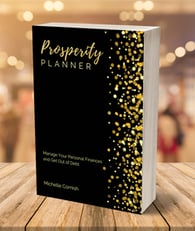Money struggles can be rough. They almost always feel like an uphill battle. But any minor thing you do to improve your finances will make a sizable difference over time. The hard part is continuing to do those little things when it feels like they aren’t making a dent in all the money you owe.
How you think about money has a huge impact on your personal finances. For example, I used to say I wanted to be debt-free. But the more I journaled about being debt-free the more uncomfortable and disappointed I felt.
It took more journaling for me to discover it was the word debt. For me, debt is a four letter word that triggers all kinds of bad thoughts and feelings. Now I use the words “financially free” instead of debt-free. It just feels better to me and you may find something similar happens to you as you explore your personal finance journey.
What Can You Do Today?
Today? Yes, today!
It may not seem like it, but the actions you take today can affect your financial future. In the beginning, it seems like you aren’t making much progress, but small actions add up. The key is to keep going. You won’t make any changes if you give up.
Here are a few ways to get started improving your personal finances today:
- Brainstorm a list of things you spend money on every day and choose one to reduce or eliminate,
- Look at your last credit card bill and determine if all those charges were necessary,
- Google "affirmations about money" and choose a few that feel like a good fit for you. Bonus points for writing them down and using them!
Recognizing It’s Time for a Change
The thing about change is it's hard work. But if you aren't happy with the way things are and your current personal financial situation, change is the only thing that will help you.
If something is important to you, make it happen. No matter how overwhelmed you are with your financial situation, you can always change it.
Committing to Your Financial Future
There are some things you can do today to improve your financial situation. But if you want to see long-term results, you need to change the habits that got you into this situation. Here are a few techniques for committing to change.
Find a Support Buddy or Group
A friend or support group is a great source of accountability when you’re trying to change your behavior. Maybe you have a friend that would like to change their financial situation too. You don’t have to share details you’re not comfortable sharing, but you can share your progress and cheer each other on.
Financial literacy organizations are a great place to look for support groups. Try a Google search for “personal finance group” or “debt support group”. Keep in mind, these should be free to attend.
Make a Pledge to Yourself
Making a pledge to yourself can be as simple as writing a pledge in your journal or as fancy as designing a certificate, printing it, and signing it. The trick is to do something meaningful to you so you’ll be more likely to stick to your plan.
You can make a pledge to yourself then give it to someone you trust and tell them to show it to you when you‘re struggling to maintain your new healthy financial habits.
Tell Someone What You're Doing
One thing that worked well for me when I decided I'd had enough of my abysmal personal finance situation, was telling my husband what I was doing. I created a Google sheet where I planned to track our family income and expenses. I gave my husband access to the sheet so he could check it any time.
This motivated me to keep the sheet updated every week. I felt like it was my duty to keep the sheet updated in case my husband needed to check it to see what our bank balance was. I still maintain this spreadsheet on a weekly basis.
Eliminate Excess
In my post Don’t Forget About Your Finances, I discussed my TREE Method for improving personal finances—specifically, Tracking your income and expenses and Recording future expenses. Today, I want to focus on Eliminate, as in, eliminate excess.
The best way to do this is to take the previous three months of your bank and credit card statements and categorize your spending. Common categories include: groceries, entertainment, gas for vehicle, vehicle repairs, insurance for vehicle, other insurance, expenses for kids, and home repairs and maintenance. Choose categories that make the most sense for you.
Now sort through your statements and put everything you purchased in one of your categories. Once you’re done sorting, add up each category and see what you think. When I did this for the first time, I was shocked at how much I spent in some categories and it helped me decide where to cut back.
When you’re sorting through your expenses, also note anything that seems unnecessary. It’s easy to forget about subscriptions charged to your cards monthly. If you’re not using it, cancel it.
Affirmations
Making a big change in your financial situation can feel overwhelming. Make sure you take advantage of any support available to you. Affirmations are one tool I love using when I feel stressed.
Here are some affirmations to get you excited about turning your finances around.
- An abundance of money is on its way to me now.
- Saving money is fun.
- I am responsible with my money.
You can find tons more by searching Google. Choose ones that make you feel good when you read them and don't be afraid to choose new ones as your progress on your journey to improve your personal finances.
Journal Prompts
What can I do to improve my financial situation?
When answering this question, no ideas are terrible. Keep writing until you feel you’ve exhausted all possibilities. It might surprise you how many great ideas you come up with for improving your financial situation.
How does saving money make me feel?
Focus on the positive here. Sometimes saving money can feel restrictive because you can’t buy whatever you want when you want it. So take this opportunity to write about how good it feels when you pay down a bit of debt or set aside some money for your future.
If you’re feeling a little down because you haven’t been able to save any money, then imagine how you will feel when you reach your savings goal and write about that. Part of reaching your goals is feeling that sense of accomplishment even before you hit your goal. You can do it!
For my finances, what is most important to me right now?
When you are trying to pay household bills, reduce your debt, set aside some money for emergencies, and save for your retirement, it can feel overwhelming. Journal about your priorities for your finances. Focus on one thing for now. Then, as your situation improves, you can add other things to focus on.
The minor changes you make in your habits today can lead to big changes in your finances if you stick with it and use the tools available to you. Once you recognize you need to make a change, commit to making that change happen, and find the support you need. You are well on your way to having those small changes add up to big results!
*****
Have you read this Money Matters article? *What's Your Money Story?
From Mari:
Please comment below on how this Money Matters column has helped you.
Also, leave your suggestions for future topics you'd like to see discussed.
#JustWRITEON!

Author bio: Michelle Cornish is the author of Prosperity Planner: Manage Your Personal Finances and Get Out of Debt, an undated planner where she shares more about her personal financial journey and her TREE Method for keeping her personal finances in check.
Now On Sale In Our Store!



Leave Comment